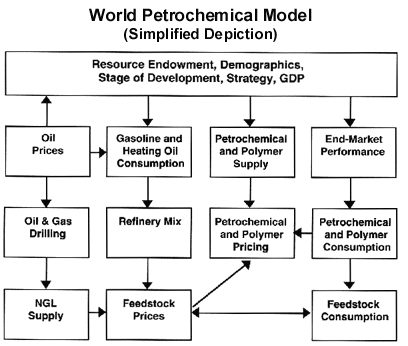



|
Data & Models
Probe Economics LLC, began as an econometric modelling shop at a U.S.
university; so models and databases are an important, if not the most important, core
competency of the company. Most of Probe’s models go back to "Economics
101," which taught us that prices and volumes are determined by the intersection of
supply and demand curves. Probe personnel have command of, and have used successfully in
business situations, some sophisticated techniques, including mixed-integer programming,
dynamic optimal control theory, Rockefellar duality theory, regional input-output models,
and non-linear equation estimation, but these techniques all hark back to that simple,
"Economics 101" principle.
Most of Probe’s modelling techniques can be found in academic
journals and textbooks, but no-one, other than Probe, has applied them successfully to
real chemical industry business problems. We know which techniques will work, stay within
a budget and deliver results that the client can understand and use. Even though more
sophisticated techniques are available, we often recommend a simpler approach for the
client, in order to stay within the budget and mesh better with the client’s way of
thinking and working.
One of Probe’s better-developed models is for world petrochemicals. This model,
which is coded into thousands of lines of linked electronic spreadsheets, can be depicted
roughly as follows:

Typical of many of Probe’s models, the analysis begins at the top
and proceeds downward (sometimes called a "Top-Down" approach). It begins with
macro factors such as a country’s resource endowment, demographics, stage of
development, political system, trade strategy and economic output (GDP). The factors drive
the supply and demand for petrochemicals and polymers, as well as the development of the
energy and refining sector that is so important to petrochemicals. Oil prices and resource
endowments determine the level of oil and gas drilling and, ultimately, the supply of
hydrocarbons for use in chemical production. Demographics and income levels determine the
demand for heating oil, gasoline and other refined products, which in turn determine
refinery configuration and the prices of chemical feedstocks. In the end, this methodology
generates internally-consistent and reasonably-accurate forecasts of chemical supplies,
demands and prices by country and region.
Probe personnel have developed and successfully used similar models for
chlor-alkali, other inorganic chemicals, rubber chemicals, oil and gas, uranium and a wide
variety of other materials. This body of knowledge and experience positions Probe to build
a model that addresses your specific business problem and provides insights and approaches
that would not otherwise be apparent.
For more information, E-Mail us at fred@probeeconomics.com
Copyright © 2024 Probe Economics LLC All rights reserved.
|
|
